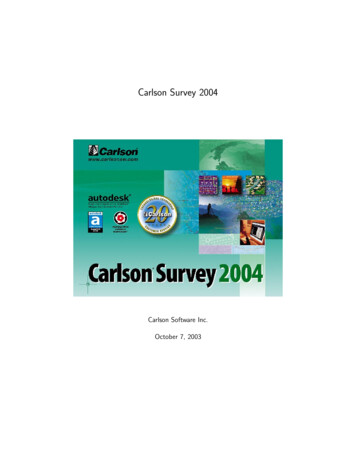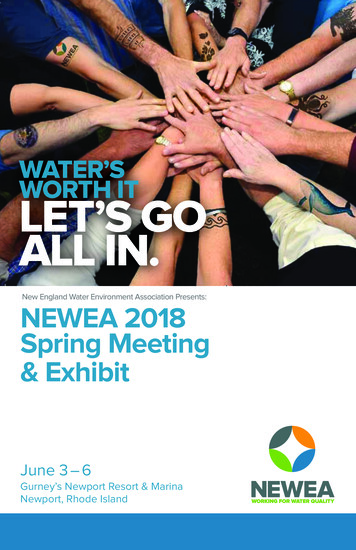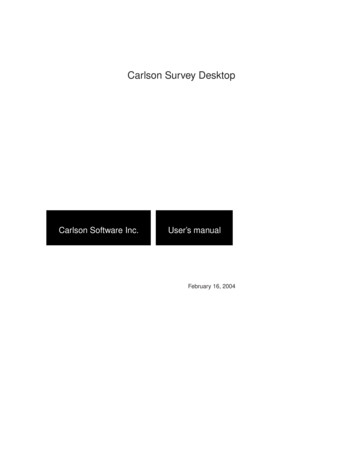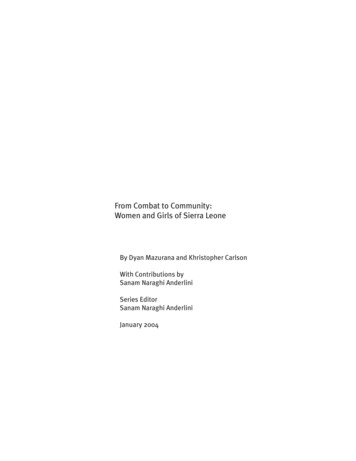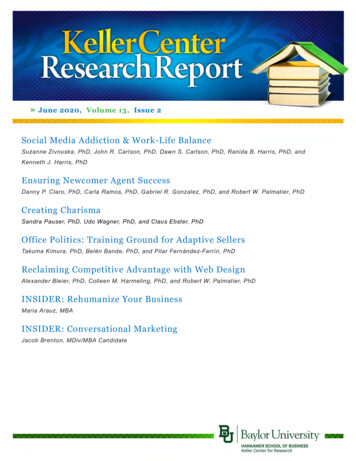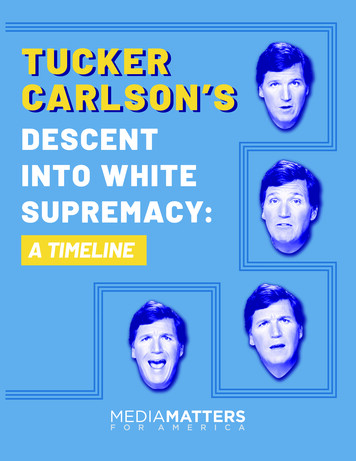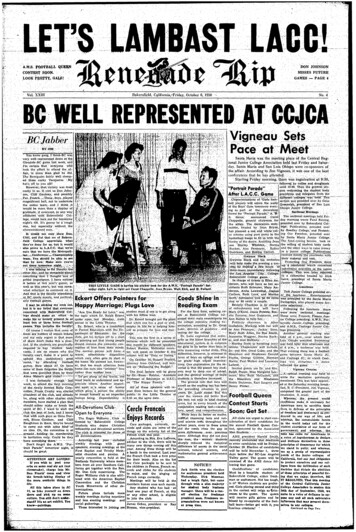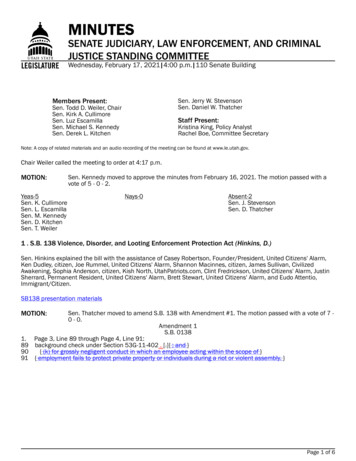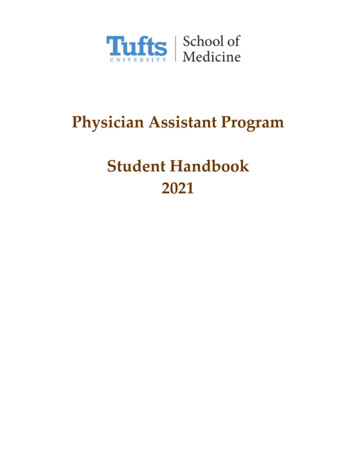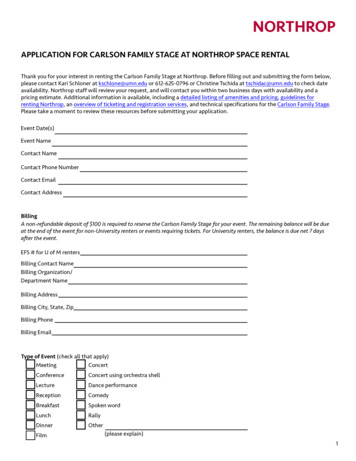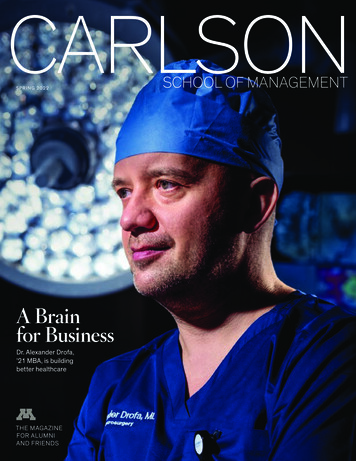
Transcription
CARLSONS P R I N G 20 2 2A Brainfor BusinessDr. Alexander Drofa,’21 MBA, is buildingbetter healthcareTHE MAGAZINEFOR ALUMNIAND FRIENDSSCHOOL OF MANAGEMENT
CARLSONRight: Kelly Yang,’21 BSB, provespersistence pays off.S P R I N G 2022THE CARLSON SCHOOLO F M A N AG E M E N T M AG A Z I N EF O R A LU M N I A N D F R I E N D SDISCOVERBelow: Studentathletes can now makemoney on their name,image, and likeness.See what’s workingso far and what liesahead. Illustration byValerie Chiang.3Start-Up News6Syllabus in 607 3 People, 3 Questions8Opposite: Studentswatch trained therapydog Cayleigh performfor a treat as part ofBoynton Health’s PetAway Worry and Stress(PAWS) program inthe Carlson SchoolAtrium in January2022. The popularPAWS program offersa chance to interactwith dogs, chickens,and other furry friendsto promote positivemental health.Faces of CarlsonF O C U S : U N S T O P PA B L E10Faculty Research12Faculty Profile16The Class of ’22 inding opportunitiesFdespite a worldwide pandemic263022 A Brainfor Business Dr. Alexander Drofa, ’21 MBA26Alumni Profile30Student-AthletesE N G AG E35News & Notes36Executive Spotlight37Force for Good38Giving42 Takeaways43Class Notes48 5 Things I’ve LearnedS P R I N G 2 0 22 C A R L S O N S C H O O L O F M A N A G E M E N T1
DISCOVERFROM THE DEANOn Our Missionand My FutureAs dean of the CarlsonSchool for the past 10years, for me, it has alwaysbeen about the mission.It’s about embracing ourpurpose to create a brighterfuture for Minnesota, ournation, and the world. It’sabout focusing on our promise to our students, toprepare them for lives and careers that are fulfillingand make a profound difference in their communities.As I look forward to transitioning back to ourfaculty sometime next year from serving as yourdean, I’m renewing that pledge to keep our missiontop of mind. It has been a privilege to lead thisamazing school, and I will stay on until a new deanis appointed and takes over. There is still much todo, and I remain committed to ensuring the CarlsonSchool’s excellence as we look ahead to the future.It’s no secret that these past two years have beendifficult for many. This too-long period of adjustingand re-adjusting, and, in so many ways, of beingdistant from one another, has often distracted us.We are not alone. I hear that from a wide circleof deans at other world-class business schools.Soon, as we turn to what living with COVID-19might look like, we can’t forget our fundamentalmission—to develop and disseminate the ideasthat will change how organizations function, andto enable our students to dream big and go into theworld ready to live the ideals of business as a forcefor good. Thanks to our outstanding staff and faculty,we’re constantly improving how we do that, withcountless success stories. Our alumni and donorsplay critical roles, too, for which we’re grateful.More than ever, we must work with our partnersin the business community to help our studentsbecome thoughtful, inclusive leaders in tomorrow’sworld. We need, too, to be aware of the needsof our alumni and other working professionalsto have just-in-time education and support.In doing so, valuing diversity in our schooland community is critical. Gazing into the next10 years, I see us becoming a more diverse andmore welcoming place, a place where everyonefeels comfortable and can thrive. It will take allof us doing our part to achieve this vision.So, as I mark this humbling anniversary, let’srevisit our mission with energy and optimism.Now’s the time to re-examine who we are, wherewe want to go and how we can enhance ourpromises to our students and to our community.Our mission must guide us, as it has me forthese 10 wonderful years I have had the privilegeof serving as your dean. I will continue to cherisheach day I have left leading this special place.Warmest regards,Sri Zaheer,Dean, Carlson School of Management“I was beyondimpressed with thedepth of expertise andengagement shownby Carlson Schoolfaculty, staff, alumni,and Board members.”— ANGEL A SPR ANGERNew Chief DiversityOfficer BeginsIn mid-February,Dean Zaheerannounced AngelaSpranger, PhD,MBA, as the Carlson School’s newchief diversity officer and foundingdirector of the Center for DEI in Business.Spranger comes to Minnesota fromChristopher Newport University in Newport News, Virginia where she servedas Assistant to the President for Equityand Engagement and Chief Diversity,Equity, and Inclusion Officer. She wasalso an Assistant Professor of Management in the Luter School of Business.“I was beyond impressed with the depthof expertise and engagement shown byCarlson School faculty, staff, alumni, andBoard members thus far, on the journeytowards inclusive excellence,” saidSpranger, who is the first person to holdthese roles at the school. “I’m gratefuland honored for the opportunity to serve.”Spranger holds a doctorate from RegentUniversity, Master of Arts in Educationfrom George Washington University,Master of Business Administration fromVirginia Commonwealth University, andBachelor of Arts from Duke University.She began her job on April 1 andis busy getting to know membersof the community.2U N I V E R S I T Y O F M I N N E S O TAS TA R T- U P N E W SSchool LeadersFocus on the FutureDean Zaheer to transition to faculty, two new leaders join schoolExactly 10 years into her tenure, on March 8—also International Women’s Day—Dean SriZaheer announced that she will “transition backto the faculty over the course of the next year.”In messages to faculty, staff, students, alumni, andothers, Zaheer expressed her gratitude for thecontributions of everyone who was part of herjourney. “Your contributions are the reason weare among the best business schools in the world.It has been one of the greatest joys of my life toserve as your dean.”Zaheer still has much she wants to accomplish.Already, though, her tenure has enhanced andelevated the school in a variety of ways, includingraising 190M as part of the Driven. campaign,adding to an impressive increase in philanthropyduring the last decade. A Military Veterans Initiative to help servicemen and women transitionfrom military to business careers, launched in2012, resulted in the Carlson School being namedthe number one Military Friendly business schoolin the nation three years running.University of Minnesota Executive VicePresident and Provost Rachel Croson will lead anational search to fill the role. Zaheer will stay onuntil a new dean begins.The first Indian-American dean in the University’s history and only the second woman to hold thedeanship, Zaheer also holds the Elmer L. AndersenChair in Global Corporate Social Responsibility.New Assistant Dean Joins Undergraduate ProgramIn October 2021, theCarlson School welcomedNicholas Wallace as thenew assistant dean of theUndergraduate Program.In this role, Wallace isresponsible for the strategyand operations of the program, includingstudent enrollment; diversity, equity, andinclusion efforts; career services; academicadvising; and marketing, communications, andfiscal oversight.Before joining the Carlson School, Wallaceserved as dean of Liberal Arts and STEMat Dakota County Technical Collegeand held admissions leadership roles atRutgers Law School and the University ofMinnesota Law School.Wallace holds a BA from St. Olaf College,a JD from the University of MinnesotaLaw School, and a PhD in OrganizationalLeadership, Policy, and Development alsofrom the University of Minnesota.S P R I N G 2 0 22 C A R L S O N S C H O O L O F M A N A G E M E N T3
S TA R T- U P N E W SDespite Labor Shifts,Carlson School PostsStrong EmploymentNumbersVeterans Serve Veterans ThroughCarlson Consulting Enterprise ProjectThe Full-Time MBA, Part-Time MBA,Master of Human Resources andIndustrial Relations, Master of Sciencein Finance, and Undergraduateprograms all have at least 93 percentof its graduates accepting job offerswithin 90 days.“Young people areforcing the worldto take noticeand respond—totry and delivera better worldthan the one theywere born into.”Some industries, such as healthcare,have grown because of the pandemic.The Graduate Business Career Center(GBCC) reports 30 percent of 2021Full-Time MBA graduates foundemployment in healthcare, the highestof any industry tracked and a 19percent increase from 2020.Overall, the Full-Time MBA programsaw 95 percent of its graduatesreceive job offers within three monthsafter graduation, with an averagestarting base salary of 112,000 .With more students looking at theirquality of life, the GBCC is trackingbenefits packages, which continue toprovide compelling perks. Starting thisfall, how graduates work (remotely,hybrid, or in-person) will be monitored.The Undergraduate Program sawsimilar success, with 97.6 percentof graduates finding employment,which includes a full-time opportunity,graduate school, volunteering, orjoining the military within 90 days ofgraduation. The average starting salarywas just under 62,000, the highest inschool history.After a dramatic rise in unemploymentat the beginning of the pandemic,the need for workers came soaringback in 2021. “The great newsfor Carlson School grads is thatemployers are competing very hard,especially for younger workers,” saysAssistant Professor Aaron Sojourner,who specializes in labor economics.“Employees under age 25 areexperiencing the fastest wage growthever seen in records that go back inmany decades.”— SUSANNA GIBBONSReflections from theInternational Climate ConferenceWorld leaders met in November2021 at the United Nations climateconference, COP26, to negotiate adeal to decrease greenhouse gasemissions to reduce the impactsof global warming.Susanna Gibbons, the managingdirector of the school’s David S.Kidwell Funds Enterprise, wasamong the University of Minnesota delegation that attended thehistoric gathering in Scotland.“The clear message from COP26was that it is time to act,” shesays. “There was no disagreement on that point. We have nomore time to waste. In orderfor our actions to be effective,we need to collaborate in waysthat we have not in the past.”Nations participating in theconference adopted the GlasgowClimate Pact, which includesstrengthening the efforts to buildresilience to climate change, curbgreenhouse gas emissions, andprovide the necessary financingfor both. These agreements canWhile the conference outlineda daunting road ahead, Gibbons says she left Scotlandwith hope for the future.“Young people—not just in ourdelegation—were clearly frustrated with the slow pace of progress to date, but I think they areforcing the world to take noticeand respond—to try and delivera better world than the one theywere born into,” she says.The project is a partnership betweenthe Carlson Consulting Enterprise(CCE), where students work witha real-world client to assess waysto improve business practices, andOutward Bound USA, an experientialand outdoor education nonprofit.The organization turned to CCEto review its program designedfor military veterans with just onerequest: Have military veterans workon the project. Pat Shuman andJoe Crawford, ’22 MBA, two formerMarines, jumped at the opportunity.“That loss of community can be sojarring for veterans regardless ofwhat you did in service,” Crawfordsays. “Being able to have the abilityhave major impacts on businesses, but Gibbons says leadersneed to find ways to adapt.“Businesses need to make decisions not just on whether they arerequired to price external consequences [like carbon emissions]today, but on how those impactsmay be felt across time,” she says.“We have seen time and again—whether it is with asbestos ortobacco—businesses that donot anticipate shifts in society’swillingness to accept the consequences will ultimately lose.”Helping a fellow military memberdoesn’t end when service is over—and a project within the CarlsonSchool of Management is allowingveterans to hold true to that promise.“The clearmessagefrom COP26was that it istime to act.”— GIBBONSCarlson School Faculty MembersRack Up National Awardsto positively improve OutwardBound’s program and see if thereare ways to serve more veterans in ayear, I think is very worthwhile.”More than a connection with nature,Outward Bound USA’s free programallows veterans to rediscover theirstrengths in a team-building expedition. While the program receiveshigh interest, it struggles with highcancellation rates among participants, causing a financial drain onthe system.Through CCE, students interviewedstaff across the entire organizationand analyzed data to evaluatecurrent program challenges.The team hopes to streamlineoperations, determine how itcompares to others in the market,and lay the foundation for OutwardBound USA to build sustainablepartnerships to integrate theprogram within a treatment network.More than aconnection withnature, OutwardBound USA’sprogram allowsveterans torediscover theirstrengths in ateam-buildingexpedition.For his countless contributionsto the field of informationsystems, Professor AlokGupta, Carlson School seniorassociate dean of faculty,research, and administration,received the LEO Award forcareer achievement from theAssociation for InformationSystems (AIS).The award, which is the highest honor given by AIS,recognizes outstanding scholars who have made a globalimpact on the discipline.As the Curtis L. Carlson Schoolwide Chair in InformationManagement, Gupta’s research focuses on economicengineering of systems—where system design explicitlyconsiders incentives of participants—as applied to avariety of transactional systems from the Internet, real-timedatabases, B2B systems, and e-commerce.Pinar Karaca-MandicSoumya SenDr. Archelle GeorgiouGupta was also part of two researchinitiatives from the Carlson Schoolwhich were recognized with the2021 INFORMS Information SystemsSociety Design Science ResearchAward. Gupta’s research on flowermarket auctions shared the award,which is one of the top in the field ofinformation systems, with the COVID19 Hospitalization Tracking Project ledby Professor Pinar Karaca-Mandic;Associate Professor Soumya Sen; Dr.Archelle Georgiou, an executive-inresidence; and PhD student Yi Zhu.Carlson School Professor Ravi Bapnaand two co-authors were honoredwith the “Best Publication of 2020” atthe annual International Conferenceon Information Systems (ICIS). Bapna,along with Nishtha Langer fromthe Lally School of Management atRensselaer Polytechnic Institute andRam Gopal from the Warwick BusinessSchool, were recognized for their paper“Onward and Upward? An EmpiricalInvestigation of Gender and Promotionsin Information Technology Services.”Ravi Bapna4U N I V E R S I T Y O F M I N N E S O TAILLUSTRATION: SAM ISLANDS P R I N G 2 0 22 C A R L S O N S C H O O L O F M A N A G E M E N T5
SYLLABUS IN 60 HIGHLIGHTINGI M PAC T F U L C A R L S O N S C H O O L C O U R S ES3 PEOPLE, 3 QUESTIONSMKTG 4090Finding Happiness in the Age of ConsumptionProfessorRohini AhluwaliaIn today’s culture, the pursuit of happiness through material gainsseems to be an attainable goal. Still, we feel empty, wanting,and dissatisfied time and again. Why this paradox? Using recentresearch in consumer behavior, decision making, neuroscience,and psychology, this course, developed and taught by ProfessorRohini Ahluwalia, tackles tough questions while developing a toolkit to help students on their journey to happiness and success.“ Engaging and eyeopening course.[This is] one ofthe most valuablecourses that I’vetaken during myexperience atCarlson. Not onlyhas it drasticallychanged mymindset, I believeit is changingthe course of myfuture.” —STUDENTLee ThomasCommunications Director,Carlson Analytics LabPARTICIPANTMeg Reid’22 MBAHappiness in theU.S. is falling.2021 World HappinessReport lists the U.S. asNo.19, down from No.12a decade ago. Further, theU.S. experienced a drop inhappiness during that periodgreater than most othercountries in the world.Brain chemistryplays a critical role for eachof us in our happiness.6U N I V E R S I T Y O F M I N N E S O TACollege studentsface mountingchallenges.Today, only 41 percentof college students ratetheir emotional health asabove average, comparedto 64 percent in 1985. Onthe Twin Cities campus,more than 2 in 5 studentshave a mental healthdiagnosis in their lifetime.Research showshappiness is more likely todetermine success thanvice versa. If we are happy,we’re more creative, makebetter decisions, developstronger relationships, havemore energy, are physicallyhealthier, and more efficientand productive. We’re alsobetter managers at work!Weekly reflectionactivities, daily practiceexercises, and groupassignments help studentsbetter understand their ownlives and put into practicewhat they are learning. Thetool kits they develop havestaying power and can beused across contexts.Pranav Karmacharya’24 BSB1. What areyou reading?2. What is yourfavorite website?3. What is yourdream job?I often have more than onebook going at any given time. Atthe moment, I’ve been readinga book about metabolism,the memoir Heavy by KieseLaymon, and a couple of poetrycollections, including Obit byVictoria Chang. I’m a poet myself(my first book, Honey in theDark, was recently published),and I found Chang’s collectionutterly compelling. Her book is acareful and honest considerationof grief, and the form she uses(obituaries) is very inventive.I’ll say The New York Times.For the news, of course, butalso for their cooking app,the product reviews in TheWirecutter section, and thegames. My spouse and I areobsessed with the Spelling Bee!A few years ago I developedan interest in wine and latervisited the Sonoma Valley onvacation. I think it would befun to learn more about themaking of wine, what it takesto manage a vineyard and run awinery business. Maybe I couldbe a sommelier someday?I’m reading Wintering: ThePower of Rest and Retreat inDifficult Times by KatherineMay. In light of the pandemic’stwo-year anniversary, I’mthinking about mainstreamnarratives of work, productivity,self-care, and wellness andwant to learn more aboutother frameworks that centerjustice in our conversationsabout rest and healing. Anothergood resource on this is@TheNapMinistry on Twitter.I’ve never been able to pick onefavorite anything, so I’m lovinglocal journalism at Racket andthe Minnesota Reformer, andI also recommend my favoritenewsletter Two Bossy Dames.My dream job involves helpingsocial impact organizationsin the Twin Cities build capacitythrough effective systems andequitable organizational culture.I am currently reading Hatchetby Gary Paulsen. I alwaysenjoy reading adventure andsurvival books because they areexciting to read and also have ameaningful message I can applypractically in my life. Portions ofthe book remind me that evenwhen things seem to be at thelowest point in your life, youshould always try to find hopeor a dream that anchors you,otherwise you can become lost.My favorite website isUniveilstudios.com becausemy team and I recently createdit when launching our videoproduction company, UniveilStudios. I believe that the Univeilteam will continue to shapethe website to be as engagingand impactful as possible,which is why it’s my favorite!My dream job would be todevelop my own successfulcompany that serves andpositively impacts others. I amworking toward this dreamafter I founded Univeil Studios.I started the company becauseI constantly notice that manystudents have the potential tomake life-changing impactson people, but there aren’tmany dedicated social mediachannels or companies thatare highlighting them.S P R I N G 2 0 22 C A R L S O N S C H O O L O F M A N A G E M E N T7
FACES OF CARLSONEvery person within theCarlson School communityhas a story. Our Faces ofCarlson series exploresthese unique perspectives,showcasing our deeperconnections. In this issue, ourinimitable students, faculty,staff, and alumni reflecton finding happiness andovercoming challenges.8U N I V E R S I T Y O F M I N N E S O TAGillian HedbergBen Trnka’22 MHRIR’15 MAccAssistant Professor of Accountingand Finance, College of SaintBenedict and Saint John’s UniversityLecturer, Carlson Schoolof Management“I think something that brings mehappiness is helping other peopleunlock some sort of new skill orinterest. I worked as a tutor mostof my life and right now, I also workat the [UMN] Rec[Well] Center as agroup fitness instructor. Seeing thesmile and look on [participants’]face[s] when they realize that theycan do something they didn’t thinkthey could do a week or a monthago inspires me to keep buildingand making myself better, weekto month. So just being able tostretch your limits, seeing that inother people, and being able tounlock that in other people alsoinspires me to do the same thing.”Christian Edwards’22 MBANach Karnik’21 MBA“I think like a lot of other businessschool students, I have a little bit ofimposter syndrome that manifestsitself in on-campus recruiting.You’ve got to interview, apply topositions, and you really have tobelieve in yourself and convey thatbelief to others throughout theprocess. I think that’s on my mindbecause I just got through that,and so I am really excited aboutthe opportunity that I’m going tohave next year. If you had askedme about six months ago, whetherthat would be what I was doing,I’m not sure I would’ve said yes.”“I’m in the Carlson Executive MBAProgram and I haven’t been inschool in almost 20 years. Gettingback in school and getting mymind back into a place where I’mbeing educated was a significantchallenge. I was just learning howto be a student again, learninghow to write papers, and taketests again. That was a significantchallenge I’ve overcome inthe last 18 months.”Mary LarsonProgram Coordinator,Brand & Consulting Enterprises“I have seen people I love and careabout age greatly over the lastcouple of years, which has beena difficult challenge I need toaccept. I have not overcome this.The best I can do is live with this,acknowledge it, and with purpose,make every day count and live lifeto the fullest, while not missingopportunities to let those who Ilove know how much they mean.”“Being a full-time teacher, that’salso my passion. On Mondays, Ilook forward to going into work.What really brings me happinessis seeing students succeed. It’sfun to challenge students in theclassroom and push them and thensee them push through and be ableto achieve their goal. It’s differentfor everyone. I get to ask, ‘OK,what’s your goal? How can I helpyou succeed?’ And that’s fun. I’mlucky. Every day,all day—I getto do that.”
FOCUSAlgorithms:The Human FactorBY GENE REBECKThey’re powerful business tools—but only when people are in control of the code.Algorithms have become deeply intertwined with our lives. These crafted stringsof digital code can take our online data—our shopping habits, the websites we liketo visit, our entertainment preferences—and make suggestions for products,services, and movies we might want toacquire. Algorithms are helping companiesautomate analysis and augment decisionmaking, not only about marketing but alsoother objectives, such as production andsupply chain management.Carlson School research has demonstrated that algorithms can be powerfultools for business management. But thatresearch also is revealing that they, too,need to be managed.POWERFUL TOOLS—WITH POWERFUL BIASESWhat is an algorithm? Put simply, it’sa set of digital instructions designedto analyze data and use that analysis tosolve a specific problem. In a businesscontext, these problems can includepredicting what customers will buy, ordetermining how long a certain production machine will be able to operatebefore requiring service or replacement.“Companies in all kinds of sectors areundergoing a major process of digitaltransformation,” says Ravi Bapna, professor and the academic director of theCarlson Analytics Lab. One aspect ofthis is “how to convert massive amountsof data into an asset.” Companies “aredata rich but insight poor. Analytics andalgorithms are essentially the moderntool kit,” a set of tools “that companiesneed to start understanding and startusing to make better decisions.”Still, Bapna and other Carlson Schoolscholars acknowledge that algorithms,10U N I V E R S I T Y O F M I N N E S O TAlike any tool, have limitations.For instance, they can incorporateand reinforce certain human biases thatcan work against business and societalobjectives. In a forthcoming paper,Gedas Adomavicius, chair of the CarlsonSchool’s department of Information andDecision Sciences, and Mochen Yang, anassistant professor in the department,discuss how algorithmic biases can resultin unfair decisions, and what can be doneto mitigate those biases.To take an all-too-common instance:gender bias in hiring, particularly forhigher-level positions. Many companiesuse algorithm-based tools that automateresume screening to identify qualified jobcandidates. If a company has a history ofhiring men instead of equally qualifiedwomen, a screening algorithm trainedon historical hiring data will rate womenlower. As Yang observes, “algorithmsare pattern recognition tools,” and theyidentify patterns based on the company’shistorical biases.PREDICTING THE FUTURE—MORE FAIRLYThat noted, companies also want tocreate fairer screening processes. AsAdomavicius and Yang argue in theirpaper, overcoming biases in algorithmswill be complicated. “It’s not merely atechnical problem,” Yang says. “It willtake an integrated approach.”This approach, the authors say, needsto consider the complexities in governingthe design and use of algorithms to augment decision making, such as navigatingdifferent (and sometimes incompatible)fairness objectives and adopting fairness-aware practices for data collectionand algorithmic model building. “As a“Since algorithms don’t have ‘moralprinciples,’ humans must be involved indecision making at some level.” — A L O K G U P TAF A C U LT Y R E S E A R C Hsociety, we have to play a major role inproviding frameworks for designing suchsystems,” Adomavicius says.Alok Gupta, the Carlson School’s chairin Information Management, has conducted extensive research in the strengthsand limitations of machine learning andartificial intelligence (AI), which are usedin designing and “training” algorithms.They also allow algorithms to “learn” howto make better-informed decisions byincorporating additional data.“Algorithms rely on past instances ofwhat has been experienced,” Gupta says.“When an algorithm encounters data froma previously unseen situation, it will have ahard time making robust decisions.” Thedecision it makes will be based on “thepast and whatever seemed to be the bestapproach for various parts of the problem.” But, he says, it “won’t be a creativesolution such as one a human might comeup with, nor necessarily the best one.”Like Adomavicius and Yang, Guptanotes that data often contains ourimplicit biases. But most of us, when webecome aware that this is a problem, canrecognize these biases and change ourattitudes accordingly—for our own benefit and for that of our organization. Sincealgorithms don’t have “moral principles,”Gupta adds, “humans must be involved indecision making at some level.”In other words, humans need to activelycounteract the biases that humans themselves have incorporated into automatedpredictions and decisions. To paraphrasean investment truism, past results areno guarantee of future success. This iscrucial—particularly for businesses usingalgorithms for human interactions, such ashiring and marketing. In many instances,Bapna says, the decisions they make won’t“be accurate for anyone under 30, forinstance, or for people in minority groups.”Still, algorithms will continue to playan important role in business, so understanding and improving it is key.“This is one of the most importantfactors of modern management now,” headds. “If you’re not doing this, you’re notgoing to be able to compete in the nextfive to 10 years.”Gedas AdomaviciusRavi BapnaAlok GuptaMochen YangILLUSTRATION: DAVID PLUNKERTS P R I N G 2 0 22 C A R L S O N S C H O O L O F M A N A G E M E N T11
F A C U LT Y P R O F I L EStylish Carlson School Senior LecturerRand Park wraps his teachingprowess and compassion into one big gift.PUT ABOW ON ITBY K AT I E D O H M A NIt is almost finals week, and the semester break isbeckoning. The first blasts of cold are gusting acrosscampus. The headlines shout COVID-19 is bad. Again.Carlson School Senior Lecturer Rand Park appearscompletely undeterred. He bounds into the classroom10 minutes ahead of his first section of MGMT 1005:Corporate Responsibility and Ethics, wearing a pale yellowOxford button-down shirt, a maroon-and-gold barbershopstripe bow tie, and a Goldy Gopher-themed face mask,wavy gray hair flowing over the top of his backpack.12U N I V E R S I T Y O F M I N N E S O TAS P R I N G 2 0 22 C A R L S O N S C H O O L O F M A N A G E M E N T13
F A C U LT Y P R O F I L EFor the next hour and a half, hedelivers a rapid-fire, straight-talkingmultimedia tour de force—including achoice Seinfeld mention—highlightingthe landmark Betty Dukes and LoisJenson sexual harassment cases,covering at-will employment law, andsexual harassment in the workplace.Everyone’s laptops are open, but no oneis shopping or playing games—they’refocused on the PowerPoint slideshe makes available before class.He dismisses the class, wipes the nowfull whiteboard clean, and does it all againfor a second section minutes later, withno discernible dip in purpose or energy.Park has been teaching multiplesections of this required class,sometimes year-round, for nearly adecade. By his own, and most others’estimation, that’s a long time tocarry that many students through atopic that might seem like a drag.But Mary Benner, department chairof Strategic Management and Entrepreneurship, says that it’s exactly thisopportunity that likely invigorates him.“That is a tremendous responsibility,shaping our undergraduates to be partof ‘business as a force for good,’” shesays. “I suspect Rand gets energy fromshaping how students learn, c
School of Management is allowing veterans to hold true to that promise. The project is a partnership between . the Carlson Consulting Enterprise (CCE), where students work with a real-world client to assess ways to improve business practices, and Outward Bound USA, an experiential and outdoor education nonprofit. The organization turned to CCE
